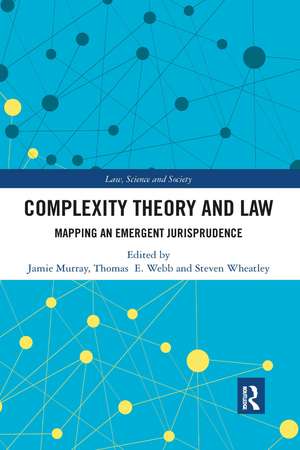Complexity Theory and Law: Mapping an Emergent Jurisprudence: Law, Science and Society
Editat de Jamie Murray, Thomas Webb, Steven Wheatleyen Limba Engleză Paperback – 3 dec 2019
Preț: 389.38 lei
Nou
Puncte Express: 584
Preț estimativ în valută:
74.51€ • 79.67$ • 62.12£
74.51€ • 79.67$ • 62.12£
Carte tipărită la comandă
Livrare economică 18 aprilie-02 mai
Preluare comenzi: 021 569.72.76
Specificații
ISBN-13: 9780367895259
ISBN-10: 0367895250
Pagini: 296
Dimensiuni: 156 x 234 x 16 mm
Greutate: 0.45 kg
Ediția:1
Editura: Taylor & Francis
Colecția Routledge
Seria Law, Science and Society
Locul publicării:Oxford, United Kingdom
ISBN-10: 0367895250
Pagini: 296
Dimensiuni: 156 x 234 x 16 mm
Greutate: 0.45 kg
Ediția:1
Editura: Taylor & Francis
Colecția Routledge
Seria Law, Science and Society
Locul publicării:Oxford, United Kingdom
Cuprins
Table of Contents
Contributors
Section I – Law’s Complexity
Jamie Murray, Thomas E. Webb and Steven Wheatley, Encountering Law’s Complexity
JB Ruhl and Daniel M. Katz, Mapping Law’s Complexity with "Legal Maps"
Section II – Complexity and the State: Public Law and Policy
Neville Harris, Complexity: Knowing It, Measuring It, Assessing It
Thomas E. Webb, Asylum and Complexity: The Vulnerable Identity of Law as a Complex System
Section III – Complexity Beyond the State: Human Rights and International Law
Steven Wheatley, Explaining Change in the United Nations System: The Curious Status of Security Council Resolution 80 (1950)
Dimitrios Tsarapatsanis, The "Consensus Approach" of the ECtHR as a Rational Response to Complexity
Anna Marie Brennan, Prospects for Prosecuting Non-State Armed Groups under International Criminal Law: Perspectives from Complexity Theory
Section IV Complexity and Business and Finance Regulation
Mark Chinen, Governing Complexity
Michael Leach, Complex Regulatory Space and Banking
Jamie Murray, Regulating for ecological resilience: A new Agenda for Financial Regulation
Section V – Complexity and the Ethics of Law and Legal Practice
Lucy Finchett-Maddock, Nonlinearity, Autonomy and Resistant Law
Minka Woermann, Complexity and the Normativity of Law
Julian Webb, Regulating the Practise of Practice: On Agency and Entropy in Legal Ethics
Contributors
Section I – Law’s Complexity
Jamie Murray, Thomas E. Webb and Steven Wheatley, Encountering Law’s Complexity
JB Ruhl and Daniel M. Katz, Mapping Law’s Complexity with "Legal Maps"
Section II – Complexity and the State: Public Law and Policy
Neville Harris, Complexity: Knowing It, Measuring It, Assessing It
Thomas E. Webb, Asylum and Complexity: The Vulnerable Identity of Law as a Complex System
Section III – Complexity Beyond the State: Human Rights and International Law
Steven Wheatley, Explaining Change in the United Nations System: The Curious Status of Security Council Resolution 80 (1950)
Dimitrios Tsarapatsanis, The "Consensus Approach" of the ECtHR as a Rational Response to Complexity
Anna Marie Brennan, Prospects for Prosecuting Non-State Armed Groups under International Criminal Law: Perspectives from Complexity Theory
Section IV Complexity and Business and Finance Regulation
Mark Chinen, Governing Complexity
Michael Leach, Complex Regulatory Space and Banking
Jamie Murray, Regulating for ecological resilience: A new Agenda for Financial Regulation
Section V – Complexity and the Ethics of Law and Legal Practice
Lucy Finchett-Maddock, Nonlinearity, Autonomy and Resistant Law
Minka Woermann, Complexity and the Normativity of Law
Julian Webb, Regulating the Practise of Practice: On Agency and Entropy in Legal Ethics
Descriere
Complexity theory understands law as an emergent, complex, self-organizing system in which an interactive network of actors and systems operate with no overall guiding hand, giving rise to complex collective behavior. This collection explores the different ways in which the insights from complexity theory can be applied to law.
















